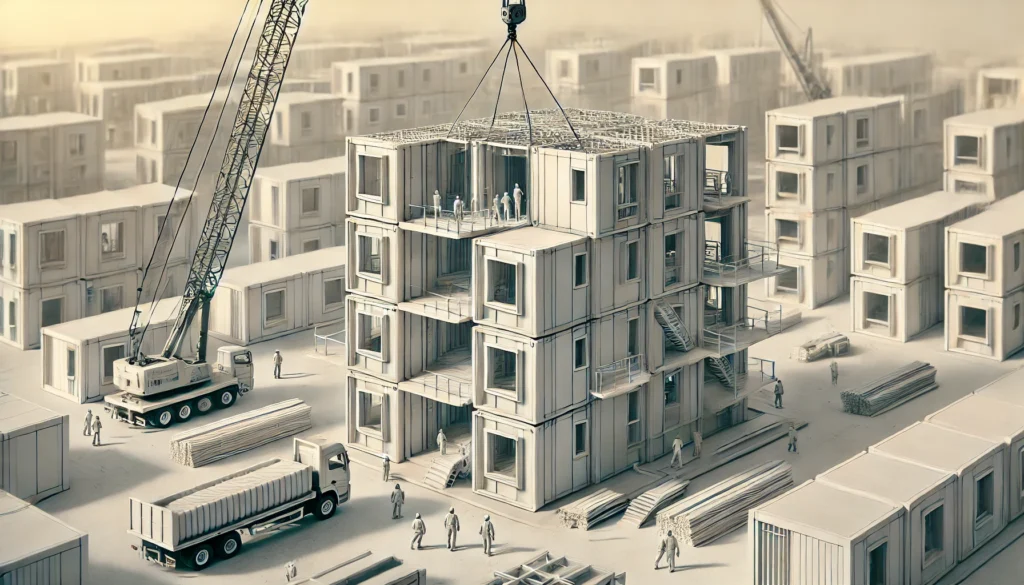Construction management plays a pivotal role in ensuring the success of any construction project, whether it’s a residential building, commercial space, or infrastructure project. Proper construction management helps streamline the entire process, reducing risks, keeping projects on schedule, and maintaining cost efficiency. Whether you’re a contractor, property developer, or project manager, understanding the core principles of construction management can ensure your projects are completed successfully.
This comprehensive guide will explore everything you need to know about construction management, its importance, core elements, best practices, and the latest trends reshaping the industry.
What is Construction Management?
Construction management is the professional service that uses specialized project management techniques to oversee the planning, design, and construction of a project from inception to completion. The objective is to control the project’s time, cost, and quality. Construction managers are the key to transforming architectural designs into tangible structures while minimizing disruptions and avoiding costly delays.
Construction management is different from simple construction project supervision because it requires an in-depth understanding of various construction processes, including site planning, risk management, procurement, quality control, and cost estimation.
Key Responsibilities of a Construction Manager
- Project Planning: Developing the project’s roadmap, including timelines, resource allocation, budgeting, and setting realistic milestones.
- Risk Management: Identifying potential risks early on and developing mitigation strategies.
- Cost Management: Keeping the project on budget through efficient resource management and cost tracking.
- Quality Control: Ensuring the project meets design and quality standards.
- Compliance: Making sure that the project adheres to local regulations, building codes, and safety standards.
- Team Coordination: Managing a multidisciplinary team of architects, engineers, contractors, and vendors.
Why Construction Management Matters
Construction projects are notoriously complex, and without proper management, they can quickly spiral out of control. Effective construction management ensures that resources are used efficiently, deadlines are met, and risks are mitigated. The stakes are high, especially in large projects where delays can cost millions, and quality issues can compromise the safety and longevity of the structure.
Benefits of Construction Management
- Cost Efficiency: Proper budgeting and financial oversight reduce the chances of overspending.
- Time Management: With clear scheduling and time management, construction projects stay on track, avoiding delays and penalty costs.
- Quality Assurance: Construction managers ensure that the project meets both the client’s specifications and the required building standards.
- Risk Mitigation: Construction managers proactively identify and mitigate risks that could hinder project success.
- Compliance: Managers ensure the project adheres to all local codes, safety requirements, and environmental regulations.
Phases of Construction Management
1. Pre-Construction Phase
The pre-construction phase is where all planning, budgeting, and feasibility studies occur. During this stage, construction managers work closely with architects, engineers, and clients to ensure that all design elements align with the project’s goals.
Key Steps:
- Feasibility Studies: Understanding whether the project is viable from both financial and practical standpoints.
- Budgeting: Creating a detailed budget covering materials, labor, equipment, and contingencies.
- Design Review: Collaborating with architects and engineers to ensure that the design is practical, compliant with regulations, and aligned with client expectations.
- Site Analysis: Assessing the construction site for any logistical challenges such as soil stability, access routes, and environmental concerns.
2. Design Phase
In this phase, the design elements of the project are finalized. Construction managers work with architects and engineers to ensure the design is not only visually appealing but also structurally sound and cost-efficient. During this phase, managers focus on:
- Constructability Reviews: Ensuring the design can be built efficiently, identifying potential issues before they arise during construction.
- Value Engineering: Evaluating cost-saving opportunities without compromising quality or functionality.
3. Procurement Phase
The procurement phase involves securing all necessary materials, equipment, and labor. This phase includes:
- Vendor Selection: Identifying and hiring subcontractors, material suppliers, and other vendors.
- Contract Negotiation: Finalizing contracts that define the scope of work, timeline, and payment terms.
- Supply Chain Management: Coordinating the timely delivery of materials and equipment to avoid project delays.
4. Construction Phase
This is the phase where the actual building begins. Construction managers play a hands-on role, ensuring that daily operations run smoothly and that all teams are aligned with the project timeline and budget.
Key Responsibilities:
- On-Site Supervision: Monitoring the daily progress of the construction site to ensure quality and adherence to the schedule.
- Quality Control: Ensuring that all materials and workmanship meet the required standards.
- Safety Management: Ensuring compliance with occupational health and safety standards to prevent accidents.
- Reporting: Providing regular updates to stakeholders on progress, risks, and budget status.
5. Post-Construction Phase
Once the physical construction is complete, the project enters the post-construction phase. This includes:
- Final Inspection: Conducting a thorough inspection to ensure all work complies with building codes and client expectations.
- Punch List: Creating a list of any minor issues or defects that need to be resolved before project close-out.
- Commissioning and Handover: Handing over the completed project to the client, along with all necessary documentation, such as warranties and operation manuals.
Best Practices in Construction Management
- Effective Communication: Keep all stakeholders informed and updated on project progress and changes.
- Continuous Risk Assessment: Regularly assess project risks and adjust mitigation strategies as needed.
- Embrace Technology: Utilize project management software, Building Information Modeling (BIM), and other digital tools to enhance efficiency and accuracy.
- Regular Audits and Reviews: Conduct periodic reviews of the project timeline, budget, and quality standards to ensure alignment with goals.
- Sustainability Practices: Incorporate green building practices to reduce the project’s environmental impact and meet modern sustainability standards.

Trends in Construction Management
1. Technology Integration
The construction industry is experiencing a technological revolution. Technologies like Building Information Modeling (BIM), drones, and AI-driven project management software are being used to streamline the planning and execution of projects. Drones, for instance, allow for real-time site inspections, while AI tools can predict risks, enhance project scheduling, and optimize resource allocation.
2. Sustainability and Green Construction
Sustainability is becoming an essential consideration in modern construction management. Green building certifications, such as LEED (Leadership in Energy and Environmental Design), are influencing how projects are designed, built, and operated. Construction managers are increasingly responsible for implementing sustainable practices that reduce energy consumption, lower waste, and minimize the environmental impact of projects.
3. Modular Construction
Modular construction is gaining traction as an efficient alternative to traditional construction methods. In modular construction, building components are manufactured off-site and then assembled on-site. This approach reduces construction time, waste, and costs while maintaining quality.
4. Safety and Compliance
The focus on safety in construction management has never been more critical. With new regulations and a growing emphasis on worker health and safety, construction managers are expected to implement stringent safety measures and ensure compliance with all local laws and codes.
FAQ on Construction Management
1. What do you mean by construction management?
Construction management refers to the professional service that uses specialized project management techniques to oversee the planning, design, and construction phases of a project. It involves managing resources, timelines, costs, and risks to ensure that the project is completed on time, within budget, and to the required quality standards. Construction managers are responsible for coordinating all aspects of the project, from conceptualization to final inspection.
2. What is the role of construction management in construction?
The role of construction management in construction is to ensure that the project runs smoothly by overseeing all aspects of the construction process. This includes project planning, cost management, time management, quality control, contract administration, and safety management. Construction managers serve as the link between the client, the contractors, and other stakeholders to ensure that the project meets the client’s specifications and adheres to safety and regulatory standards.
3. What are the two types of construction management?
The two primary types of construction management are:
- Agency Construction Management: In this model, the construction manager acts as an advisor or consultant to the owner without directly being involved in the construction process.
- At-Risk Construction Management: Here, the construction manager takes on a more active role, overseeing the project while also assuming the financial risk of delivering the project within a guaranteed maximum price (GMP).
4. What is the difference between construction management and project management?
While both roles involve overseeing and managing a project, construction management is focused specifically on construction-related projects and deals with the technical aspects, such as site management, safety regulations, and compliance with building codes. Project management, on the other hand, is a broader field that applies to any industry and focuses on managing the project’s overall objectives, timelines, and stakeholder communications. Project managers may handle several types of projects, including IT, finance, or product development, while construction managers specialize in building and infrastructure projects.
5. What are the 4 main types of construction?
The four main types of construction are:
- Residential: Involves the construction of homes, apartments, and housing complexes.
- Commercial: Includes office buildings, shopping centers, and other business-related infrastructure.
- Industrial: Encompasses factories, power plants, and other heavy industrial structures.
- Infrastructure: Refers to the development of public works like roads, bridges, airports, and water systems.
6. What are the three types of construction?
The three types of construction typically refer to the classifications based on the project’s purpose and scope:
- Building Construction: Covers residential, commercial, and institutional buildings.
- Infrastructure Construction: Focuses on civil engineering projects such as roads, railways, and bridges.
- Industrial Construction: Includes large-scale projects like factories, power plants, and other heavy industry facilities.
Conclusion
Construction management is essential for the successful execution of construction projects, ensuring they are delivered on time, within budget, and meet quality standards. By integrating new technologies, adopting sustainable practices, and prioritizing safety, construction managers can ensure the smooth and efficient completion of complex projects.


